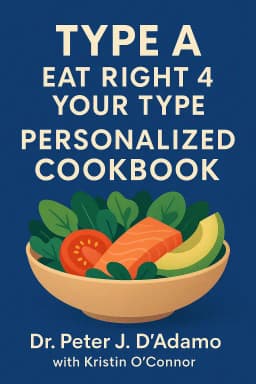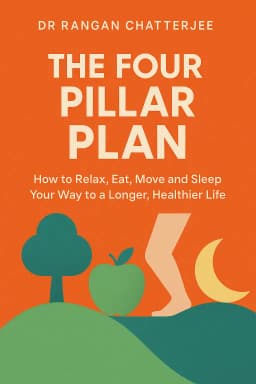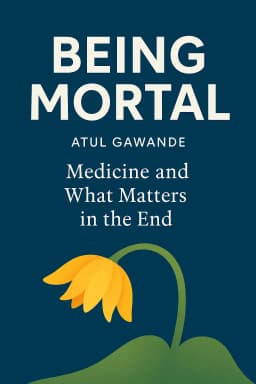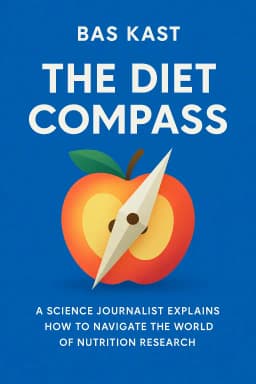
The Clean Lie: Uncovering the Unwashed History of Your Skin
Golden Hook & Introduction
SECTION
Orion: eck, what if I told you that one of the most common anxieties of modern life, body odor, was basically invented in a locker room in 1926? That it wasn't a widespread concern until a soap company decided to make it one?
eck: You know, that doesn't surprise me at all, but it's absolutely fascinating. It feels like the classic playbook: first, you manufacture an insecurity, and then you graciously sell the cure for it. I'm already hooked.
Orion: Exactly. It's a story that perfectly captures the core of the book we're diving into today, "Clean: The New Science of Skin and the Beauty of Doing Less" by James Hamblin. It's a journey that challenges our most fundamental daily rituals and asks a simple question: why are we so obsessed with being clean?
eck: A question I think most of us have never even thought to ask. We just do it.
Orion: Right. And Hamblin's work is perfect for a curious mind like yours, because it sits at this incredible intersection of history, marketing, and cutting-edge science. So today we'll dive deep into this from two perspectives. First, we'll travel back in time to uncover how the very idea of being 'dirty' was invented and sold to us.
eck: The historical heist. I love it.
Orion: Then, we'll zoom in with a microscope to explore the incredible, invisible world living on our skin and what it means for our health. It's a story that will make you rethink everything you do from the moment you step into the shower.
Deep Dive into Core Topic 1: The Invention of 'Dirty'
SECTION
Orion: So let's start with that history, because it is truly wild. Before the early 20th century, people just... smelled like people. Sure, there were perfumes and basic washing, but there wasn't this pervasive social panic about the natural scent of a human body.
eck: It wasn't a moral failing or a social sin to have a scent. It was just a fact of life.
Orion: Precisely. Then came a company called Lever Brothers and their product, Lifebuoy soap. Now, Lifebuoy wasn't a gentle, fragrant beauty bar. It was a harsh, red, medicinal-smelling soap made with carbolic acid. It was an antiseptic, designed for disinfection. It smelled like a hospital.
eck: So it was a utility product, not a luxury or a social product.
Orion: Exactly. It was for preventing disease. But the company wanted to sell more of it. The legend goes that in 1926, the brother of the company's president was in a locker room after a game of golf and was just disgusted by the smells. And a lightbulb went off.
eck: Ah, the moment of creation. Not of a product, but of a problem.
Orion: The creation of a problem. They launched a new ad campaign. At first, it was for "Perspiration Odors." But that wasn't quite catchy enough. So their ad agency, J. Walter Thompson, came up with a catchier, more sinister-sounding term: "B.O." Body Odor.
eck: Wow. They literally branded a natural human function.
Orion: They branded it, and then they weaponized it. The ads were masterpieces of fear-based marketing. They didn't show happy people enjoying the soap. They showed people being ostracized. A woman with the tagline, "Always a bridesmaid, never a bride," looking forlorn because of her secret "B.O." problem. A young man being passed over for a promotion because his boss was offended by his "B.O."
eck: That is so manipulative, but also brilliant from a marketing perspective. They're not selling soap. They're selling social acceptance. They're selling career advancement. They're selling marriage.
Orion: You've nailed it. They created a social anxiety that didn't exist on a mass scale before, and positioned their harsh, medicinal soap as the only solution. And the result? Lifebuoy's sales quadrupled in just four years. They had successfully made millions of people afraid of their own bodies.
eck: It's a powerful reminder of how much of our reality is shaped by narratives, especially commercial ones. It makes me think about the wellness industry today. The language of "detoxing" and "cleansing" from toxins we didn't even know we were supposedly accumulating. It's the same playbook, just updated for the 21st century.
Orion: It's the exact same playbook. And it's so effective because it taps into our deepest fears of not belonging. This historical context is so crucial because it shows that our current obsession with being squeaky clean, sterile, and odorless isn't some timeless, biological imperative. It's a story. A story that was sold to us to move product.
eck: And a very successful story at that. It's so deeply ingrained now that questioning it feels radical.
Deep Dive into Core Topic 2: Your Body, The Superorganism
SECTION
Orion: Exactly. So industry created this powerful idea that we need to sterilize ourselves. But what if that very act is working against our own biology? This brings us to our second, and perhaps even more mind-blowing topic: the skin microbiome.
eck: Okay, so this connects to my interest in nutrition. I've read a lot about the gut microbiome, but the skin microbiome is a newer concept for me. Is the principle similar?
Orion: It's incredibly similar. Think of your skin not as a simple barrier, but as a thriving, complex ecosystem. A rainforest. Hamblin writes that we have about a billion bacteria per square centimeter of skin, trillions of them in total, from hundreds of different species. And just like a rainforest, this ecosystem has its own balance, and it plays a huge role in protecting us.
eck: So when we use harsh soaps or antibacterial everything, we're essentially clear-cutting the rainforest.
Orion: That's the perfect analogy. We're carpet-bombing the entire ecosystem to get rid of a few "bad guys," taking all the beneficial organisms with them. And the book gives this incredible real-world example of what happens when that ecosystem is allowed to thrive. It's a study comparing two very similar communities: the Amish and the Hutterites.
eck: I'm familiar with the Amish, but not the Hutterites.
Orion: They're very similar. Both are Anabaptist communities that came from the same region of Europe. They're genetically similar, they don't smoke, they breastfeed their children, and they are both very hygienic communities. But there's one huge difference in their lifestyles. The Hutterites embraced industrialized, large-scale farming. They live in modern homes, separate from the barns, and use heavy machinery. The Amish, as we know, stuck to traditional, small-scale farming. Their barns are right next to their houses, and the children are in and around the animals and the soil from the moment they're born.
eck: So the Amish have a much higher level of microbial exposure from a very young age.
Orion: A massive difference in exposure. And here's the stunning result: the Amish have some of the lowest rates of asthma and allergies in the developed world. The Hutterites have rates that are on par with, or even higher than, the average American. It's not about being "dirty" in a pathogenic sense; it's about microbial diversity.
eck: That is an incredibly powerful natural experiment. It suggests that exposure trains the immune system.
Orion: It's exactly that. The researchers took it a step further. They collected dust from Amish homes and Hutterite homes. They exposed two groups of mice to this dust. The mice that got the Hutterite dust developed asthma-like symptoms when exposed to allergens. But the mice that got the Amish dust—the dust full of a rich diversity of farm microbes—were protected. The dust acted like a vaccine against allergies.
eck: Wow. That reframes everything. It's not about avoiding germs. It's about cultivating a diverse and resilient inner and outer garden, so to speak. The goal isn't to be 'clean' in the sterile sense, but to be 'biodiverse'. It's the same principle as eating a wide variety of plants for gut health. You're feeding your internal ecosystem. This suggests we need to be feeding our external one, too.
Orion: You've hit the absolute core of it. The book even talks about how we all have microscopic mites, Demodex, living in the pores on our faces. And that's not a sign of being unclean—it's a universal part of being a healthy human. They're part of our ecosystem.
eck: So the things we've been taught to fear, like body odor or microbes, might actually be signs of a healthy, functioning system. That's a huge mental shift.
Synthesis & Takeaways
SECTION
Orion: It's a massive shift. And it brings us to the central conflict of the book. On one hand, we have a century of marketing history that has taught us to fear our own bodies and to seek sterility.
eck: A story of manufactured problems and profitable solutions.
Orion: And on the other hand, we have this emerging biological reality that tells us our bodies are not just us, but a "superorganism"—a thriving, complex ecosystem that needs diversity to be healthy.
eck: It really changes how you view your own daily habits. It's not about guilt, but about awareness. It makes me question the 'why' behind each product I use. Is this for my health, or is it to participate in a social narrative that was sold to me? That's an empowering question.
Orion: That is the perfect way to put it. It's about conscious choice. Hamblin's point isn't that everyone should stop showering. It's that we should understand the forces that shaped our routines.
eck: And to maybe be a little less afraid of our own biology. To see our bodies as allies, not as something to be constantly scrubbed and sanitized into submission.
Orion: Beautifully said. It leaves us with a final thought, a question to ponder not just in the shower, but throughout our day. It's not, "Should I stop showering?" but rather...
eck: "Which parts of my routine are for my health, and which are for a story someone sold me?"
Orion: Exactly. And just asking that question is the first step toward a new, and maybe even healthier, kind of clean.









